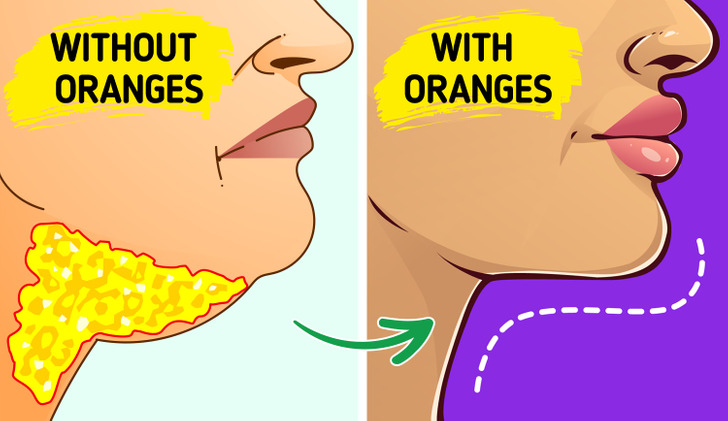1. It promotes digestive health.
2. It can aid in your efforts to lose weight.
An orange of average size has just 60 calories. The fruit also has 3 grams of fiber, which offers advantages such as better intestinal health, healthy cholesterol, a reduced chance of heart disease, and a slower rate of sugar absorption in our systems.
Additionally, fiber might prolong our feelings of fullness. A diet high in it can assist us in lowering our calorie intake and desires, which can lead to weight reduction. When eating an orange, be sure to eat both the orange flesh and the juice because that is where the majority of the fiber is found.
3. It supports your body's collagen production.
Approximately 70 mg of vitamin C are included in one orange. This essential component offers amazing advantages as well, such as enhancing iron absorption, reducing inflammation and blood pressure, and aiding in the formation of collagen in our bones.
Our bodies manufacture the protein collagen. It aids in vital procedures including immune response and tissue healing while providing structural support to tissues. Because elastin and collagen synthesis decline with age, we age and get sagging, dry skin.
Because collagen loss is a natural aspect of aging, it is impossible to completely halt it, but we can attempt to slow it down. Eating an orange a day may help.
4. Keeping your eyesight healthy might be beneficial.
According to research, eating an orange every day will lower your chance of macular degeneration, an eye illness that can cause central vision to become so blurry that even glasses are no longer helpful, by 60%. This syndrome may develop as a result of aging naturally.
Since vitamin C helps maintain the health of the blood vessels in our eyes and may be used to prevent cataracts, it is crucial for maintaining good vision. It could be a good idea to start monitoring our daily vitamin C consumption if we want to have a strong vision for the future.
5. It safeguards vital organs including the heart and brain.
Orange juice drinking may help reduce several risk factors for cardiovascular disease, according to a study of 10 research. This suggests that this delectable juice may aid in preventing heart disease, which is the leading cause of early death.
Several signs and vitamin C deficiency signs and symptoms
Since most of us obtain adequate vitamin C from our everyday diets, scurvy is a disease that is extremely uncommon but has still occurred. Collagen production is aided by vitamin C, and when there is insufficient collagen production, tissue begins to deteriorate.
Anemia, gum disease, tooth loss, poor wound healing, depression, swelling, and bone pain are a few of the signs and symptoms of scurvy. Other symptoms include weariness, lethargy, and anemia.
BONUS: Consume the peel for additional nutrition.
Despite its harsh flavor, the orange peel has several advantages. Compared to the pulp, this orange portion has nearly four times as much fiber. Along with vitamins A, B1, B2, B6, and B9, it also contains three times as much vitamin C as the inside fruit does.
Even though the peel is packed with nutrients, consuming it may not be the best idea owing to its difficult-to-digest nature and potential pesticide residue. It could be sufficient to properly wash the fruit and grate part of the peel over your meal to reap the fruit's nutritional advantages.
Please see your doctor if you are unsure of your daily nutritional consumption. Always keep in mind that anything in large quantities might be dangerous.







